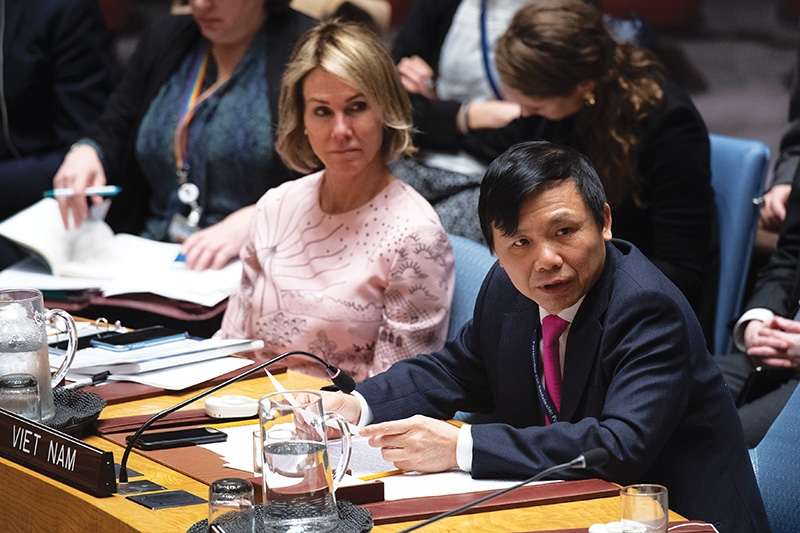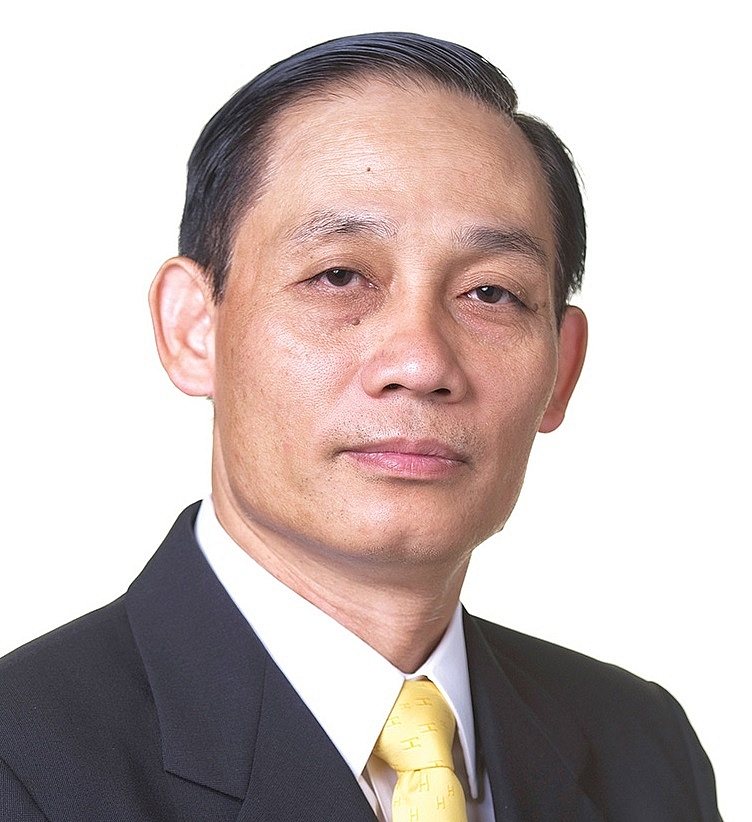Vietnam displays its spirit in lead UN Security Council role
 |
| Vietnam partook last week in the UNSC’s meeting on the Middle East, including the Palestinian issue |
This is the second time that Vietnam has become a non-permanent member of the UN Security Council (UNSC). What are the differences in Vietnam’s priorities in this membership tenure compared to the previous one in 2008-2009?
 |
| Deputy Minister of Foreign Affairs Le Hoai Trung |
Over the past decade, the international community has been united in the pursuit of peace, co-operation, and development. However, burning issues remain today, such as the Iranian nuclear issue, the Korean peninsula, and contradictions in the South Asian region. Moreover, there have been challenges such as terrorism, trans-national crime, and unilateral actions which are challenging the role of the UN and international law, as well as peace and stability in several regions.
The prime target of Vietnam joining the UNSC remains unchanged. It is to protect the country’s benefits and enable the country to boost international co-operation, building up a stable and peaceful international climate that can facilitate Vietnam to develop further. If we perform this role well while keeping in mind other nations’ interests, Vietnam’s bilateral relations with nations and partners will also be able to further develop, with Vietnam’s status and prestige being increasingly pushed forward in the international arena. In the new 2020-2021 UNSC membership tenure, Vietnam has determined specific priorities.
Firstly, we will heighten multilateralism and the role and the effectiveness of the UNSC in maintaining international peace and security, and promote dialogue and reduced tensions, while seeking solutions for conflicts in line with international law and the UN Charter. Vietnam will promote co-operation and mutual support between the UNSC and regional and sub-regional organisations, including the ASEAN, in maintaining peace and stability in the region and also the wider world. Vietnam will also foster efforts on post-conflict reconstruction, especially overcoming the aftermath of landmines and unexploded ordnance, contributing to creating a safe environment promoting sustainable socio-economic development.
Furthermore, we will also boost issues regarding humanitarianism and the protection of children, civilians, and key infrastructure, while strengthening women’s role in conflict. This is aimed at fostering sustainable peace and development.
Vietnam has concluded its key role as UNSC chair. What were the country’s achievements and benefits?
January was a special month. Normally, non-permanent member nations of the UNSC perform their membership for several months before they can undertake the council’s chairmanship. However, Vietnam acted as chair in the very first month of joining. Vietnam reaped numerous successes in the role.
First, we have made practical contributions to the council’s activities by promoting solutions considered by the UNSC in line with the UNSC Charter and international law. This has reaffirmed Vietnam’s foreign policy of peace and independence, and being a responsible member of the international community, contributing to enhancing the nation’s international prestige. During our meetings with UN leaders, nations, and international organisations, they highly appreciated Vietnam’s active role and major contributions.
Second, we performed our role as UNSC chair actively, positively, responsibly, objectively, and transparently in formulating a working agenda with other member states and relevant nations, monitoring meetings, and conducting negotiations on adopting UNSC documents. Vietnam has demonstrated its ability to monitor council activities smoothly and professionally. We have also attached importance to seeking consultancy from member states, stakeholders, and non-UNSC countries, especially those from the ASEAN and wider Asia. Vietnam has also had good relations with the media via providing intensive information about UNSC activities.
Third, last month, we succeeded in organising key events such as an open ministerial discussion on the 75th anniversary of the UN’s establishment, and a meeting on co-operation between the UN and regional and sub-regional organisations in maintaining international peace and security, with the ASEAN’s role highlighted. The meeting manifested the close link between Vietnam’s role as UNSC non-permanent member for 2020-2021 and its role as ASEAN chair this year.
As the year takes shape, we still see many conflicts continue in Africa and the Middle East, among others. How has Vietnam demonstrated its role in settling these issues at the UNSC?
In January, the UNSC organised nearly 30 meetings and considered 12 issues. Most of the agenda focused on issues for Africa and the Middle East, with the UNSC organising a periodical open discussion on the peace progress of the Middle East region, considering the situation in Mali and Libya, and looking at operations of UN missions in West Africa and Lebanon.
The UNSC also adopted three resolutions on extending cross-border humanitarian assistance in Syria, extending the operations of the UN mission in Yemen, and extending measures on a weapons embargo in the Central African Republic.
Vietnam contributed to solving these issues through its role as chair objectively and transparently. It chaired meetings skilfully in order to dispel disagreements and foster consensus among nations.
Vietnam closely monitored developments and sought consultancy from nations via various channels such as embassies and the Vietnamese Delegation in the UN.
Based on consultancy and its own policy and principles, Vietnam could advance suitable solutions and proposals to partners – which were highly valued by other nations for being practical and responsible contributions.
What will be the role of the UNSC in the time to come, as regional and global situations are forecast to become more complicated, and what will Vietnam do to continue enhancing its international status as a major contributor?
The UNSC is a global multilateral body maintaining international peace and security. Thus, with regional and global conflicts reaching higher levels of complexity, the UNSC will have move with higher alacrity and drive.
On one hand, it is likely that the council may face some difficulties in dealing with issues involving big conflicts of interest, especially for permanent member states. On the other hand, the UNSC remains effective in advancing solutions to many issues related to peace and security, and more besides.
In addition, amid the trend of increasing co-operation among UNSC non-permanent nations including Vietnam, we do hope that there will be more contributions and solutions from these nations to the council’s activities.
Vietnam has numerous favourable conditions to perform this task, because 192 UN member nations had cast votes in favour of Vietnam – this shows the world highly values Vietnam’s ability and policies, which are in line with the common view of the international community.
In the time to come, Vietnam will continue implementing its foreign policy of independence and self-reliance, being an active and responsible member of the international community, and showing responsibility in contributing to solving issues regarding international peace and security.
Another factor of great importance is that Vietnam reinforces principles of international law such as respect for national autonomy and sovereignty, peaceful resolution of all disputes, and non-interference in the internal affairs of other countries.
Vietnam’s message when joining the UNSC was is for it to be a “partnership for sustainable peace”. Thus, the country will further increase relations with partners and seek consultancy from nations to solve all issues. These principles fit the international community’s goals and agenda.
What the stars mean:
★ Poor ★ ★ Promising ★★★ Good ★★★★ Very good ★★★★★ Exceptional
Related Contents
Latest News
More News
- Vietnamese businesses diversify amid global trade shifts (February 03, 2026 | 17:18)
- Consumer finance sector posts sharp profit growth (February 03, 2026 | 13:05)
- Vietnam and US to launch sixth trade negotiation round (January 30, 2026 | 15:19)
- NAB Innovation Centre underscores Vietnam’s appeal for tech investment (January 30, 2026 | 11:16)
- Vietnam moves towards market-based fuel management with E10 rollout (January 30, 2026 | 11:10)
- Vietnam startup funding enters a period of capital reset (January 30, 2026 | 11:06)
- Vietnam strengthens public debt management with World Bank and IMF (January 30, 2026 | 11:00)
- PM inspects APEC 2027 project progress in An Giang province (January 29, 2026 | 09:00)
- Vietnam among the world’s top 15 trading nations (January 28, 2026 | 17:12)
- Vietnam accelerates preparations for arbitration centre linked to new financial hub (January 28, 2026 | 17:09)

 Tag:
Tag:

















 Mobile Version
Mobile Version